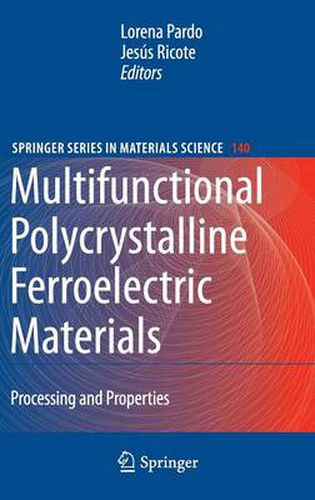Readings Newsletter
Become a Readings Member to make your shopping experience even easier.
Sign in or sign up for free!
You’re not far away from qualifying for FREE standard shipping within Australia
You’ve qualified for FREE standard shipping within Australia
The cart is loading…






This title is printed to order. This book may have been self-published. If so, we cannot guarantee the quality of the content. In the main most books will have gone through the editing process however some may not. We therefore suggest that you be aware of this before ordering this book. If in doubt check either the author or publisher’s details as we are unable to accept any returns unless they are faulty. Please contact us if you have any questions.
This book presents selected topics on processing and properties of ferroelectric materials that are currently the focus of attention in scientific and technical research.
Ferro-piezoelectric ceramics are key materials in devices for many applications, such as automotive, healthcare and non-destructive testing. As they are polycrystalline, non-centrosymmetric materials, their piezoelectricity is induced by the so-called poling process. This is based on the principle of polarization reversal by the action of an electric field that characterizes the ferroelectric materials.
This book was born with the aim of increasing the awareness of the multifunctionality of ferroelectric materials among different communities, such as researchers, electronic engineers, end-users and manufacturers, working on and with ferro-piezoelectric ceramic materials and devices which are based on them.
The initiative to write this book comes from a well-established group of researchers at the Laboratories of Ferroelectric Materials, Materials Science Institute of Madrid (ICMM-CSIC). This group has been working in different areas concerning thin films and bulk ceramic materials since the mid-1980s. It is a partner of the Network of Excellence on Multifunctional and Integrated Piezoelectric Devices (MIND) of the EC, in which the European Institute of Piezoelectric Materials and Devices has its origin.
$9.00 standard shipping within Australia
FREE standard shipping within Australia for orders over $100.00
Express & International shipping calculated at checkout
This title is printed to order. This book may have been self-published. If so, we cannot guarantee the quality of the content. In the main most books will have gone through the editing process however some may not. We therefore suggest that you be aware of this before ordering this book. If in doubt check either the author or publisher’s details as we are unable to accept any returns unless they are faulty. Please contact us if you have any questions.
This book presents selected topics on processing and properties of ferroelectric materials that are currently the focus of attention in scientific and technical research.
Ferro-piezoelectric ceramics are key materials in devices for many applications, such as automotive, healthcare and non-destructive testing. As they are polycrystalline, non-centrosymmetric materials, their piezoelectricity is induced by the so-called poling process. This is based on the principle of polarization reversal by the action of an electric field that characterizes the ferroelectric materials.
This book was born with the aim of increasing the awareness of the multifunctionality of ferroelectric materials among different communities, such as researchers, electronic engineers, end-users and manufacturers, working on and with ferro-piezoelectric ceramic materials and devices which are based on them.
The initiative to write this book comes from a well-established group of researchers at the Laboratories of Ferroelectric Materials, Materials Science Institute of Madrid (ICMM-CSIC). This group has been working in different areas concerning thin films and bulk ceramic materials since the mid-1980s. It is a partner of the Network of Excellence on Multifunctional and Integrated Piezoelectric Devices (MIND) of the EC, in which the European Institute of Piezoelectric Materials and Devices has its origin.